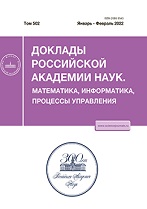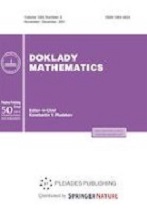|
This article is cited in 1 scientific paper (total in 1 paper)
RESULTS OF ARTIFICIAL INTELLIGENCE RESEARCH CENTERS
Fundamental research and developments in the field of applied artificial intelligence
E. V. Burnaevab, A. V. Bernshteina, V. V. Vanovskiya, A. A. Zaytseva, A. M. Bulkina, V. Yu. Ignatieva, D. G. Shadrina, S. V. Illarionovaa, I. V. Oseledetsab, A. Yu. Mikhaleva, A. A. Osiptsova, A. A. Artemova, M. G. Sharaeva, I. E. Trofimova
a Skolkovo Institute of Science and Technology, Moscow, Russia
b Artificial Intelligence Research Institute, Moscow, Russia
Abstract:
The present stage of development of artificial intelligence (AI) is based on advanced technologies and modern methods and algorithms of machine learning (ML) including deep machine learning, intellectual data analysis and other fundamental scientific areas, which in turn play an important role in delivering applied solutions in almost all areas of digital economy. However, the corresponding expansion of the AI application range and complication of the class of problems, as well as of the spectrum and the volume of data used for creation of applied AI models and AI-based intelligent system call for a significant expansion of the theoretical and algorithmic basis of AI including development of ML methods that involve mathematical and physical models of objects and phenomena of domains, methods of fusion of multimodal data, methods for constructing geometric and topological components of deep neural networks, methods for modeling 3D objects, etc. In 2021, in order to cope well with these challenges, Skoltech Research Center for Applied Artificial Intelligence was created with support from the Federal Program “Artificial Intelligence”. The aims of the Center are as follows: creation of a scientific and technological basis for solution of a wide range of relevant applied tasks for purposes of sustainable development of the economy of the Russian Federation including optimization problems of managerial decisions aimed at reduction of the carbon footprint and other urgent ESG tasks; environmental monitoring tasks for detection of anomalies and extreme situations forecast; assessment of economic and social risks and their dynamics caused by climatic changes; predictive analytic problems, etc. In the present paper, we describe new AI technologies, models, methods and algorithms developed in the Center, describe the main applied areas of research of the Center, and provide a briefly survey of the already developed scientific and applied results.
Keywords:
applied artificial intelligence, sustainable development, deep learning, machine learning, physically informed neural networks, data analysis.
Citation:
E. V. Burnaev, A. V. Bernshtein, V. V. Vanovskiy, A. A. Zaytsev, A. M. Bulkin, V. Yu. Ignatiev, D. G. Shadrin, S. V. Illarionova, I. V. Oseledets, A. Yu. Mikhalev, A. A. Osiptsov, A. A. Artemov, M. G. Sharaev, I. E. Trofimov, “Fundamental research and developments in the field of applied artificial intelligence”, Dokl. RAN. Math. Inf. Proc. Upr., 508 (2022), 19–27; Dokl. Math., 106:suppl. 1 (2022), S14–S22
Linking options:
https://www.mathnet.ru/eng/danma333 https://www.mathnet.ru/eng/danma/v508/p19
|


| Statistics & downloads: |
| Abstract page: | 169 | | References: | 53 |
|





 Contact us:
Contact us: Terms of Use
Terms of Use
 Registration to the website
Registration to the website Logotypes
Logotypes








 Citation in format
Citation in format 
